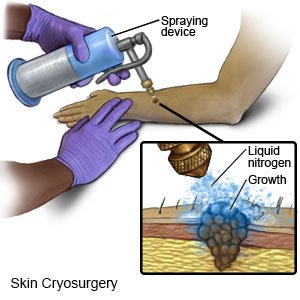Skin Cryosurgery
Medically reviewed by Drugs.com. Last updated on Apr 6, 2025.
What do I need to know about skin cryosurgery?
Skin cryosurgery, or cryotherapy, is a procedure to treat a skin lesion by freezing it. A skin lesion is a growth on your skin. Cryosurgery uses a cold substance, usually liquid nitrogen, to kill the lesion without damaging nearby healthy skin.
How do I prepare for skin cryosurgery?
- Your healthcare provider will tell you how to prepare. You may be told not to use lotion, makeup, or other items near the lesion on surgery day.
- Tell your provider about all your current medicines. Your provider will tell you if you need to stop any medicine for the procedure, and when to stop. You will be told which medicines to take or not take on the day of the procedure.
- Tell your provider if you have a medical condition that makes your body react to cold temperature. This includes cold urticaria, Raynaud disease, or cryoglobulinemia. Tell your provider if you had cryosurgery and if you had problems after the procedure.
- You may need to have blood tests, imaging tests, or a biopsy. Ask your healthcare provider for more information about these and other tests you may need.
Drugs used to treat this and similar conditions
Keytruda
Keytruda is used to treat multiple types of cancer such as melanoma, non-small cell lung cancer ...
Erbitux
Erbitux (cetuximab) is used to treat cancers of the colon and rectum. Learn about side effects ...
Omvoh
Omvoh is used to treat moderate to severe ulcerative colitis or Crohn's disease in adults. This ...
Efudex
Efudex is used for actinic keratosis, basal cell carcinoma, keratosis, skin cancer
Erivedge
Erivedge (vismodegib) is used to treat basal cell carcinoma that has spread to other parts of the ...
Pembrolizumab
Pembrolizumab (Keytruda) is a monoclonal antibody cancer medicine used to treat
Hydrogen peroxide topical
Hydrogen peroxide topical is used for oral and dental conditions, seborrheic keratosis
Imiquimod topical
Imiquimod topical is used for basal cell carcinoma, condylomata acuminata, human papilloma virus ...
Cetuximab
Cetuximab systemic is used for colorectal cancer, head and neck cancer, non small cell lung cancer ...
Fluorouracil topical
Fluorouracil topical is used for actinic keratosis, basal cell carcinoma, keratosis, skin cancer, warts
What happens during skin cryosurgery?
- Your healthcare provider may scrape the top of your lesion. Your provider will apply the cold substance with a cotton swab or spray. A gel and a cryoprobe may also be used. A cryoprobe is a long, pointed tool that is placed on your skin lesion.
- The cold substance is left on for 5 to 30 seconds, until a halo of ice forms around your lesion. Your provider may check the temperature inside your lesion by inserting a needle with a thermometer. The frozen lesion will slowly thaw out. Freezing and thawing may be repeated. The skin cells start to die when they are frozen.
 |
What will happen after skin cryosurgery?
A bandage will cover your lesion area to keep it clean and dry. You can go home when your healthcare provider says it is okay. Your lesion area may heal in 4 to 6 weeks. Larger areas may take as long as 14 weeks to heal.
What are the risks of skin cryosurgery?
- You may have discomfort, burning, or pain during and after your skin cryosurgery. Your skin may be red or swollen, or a blister may form. Your skin may bleed, or you may get an infection. If cryosurgery was done to treat a lesion on your face, you may have a headache after the procedure.
- The treated skin may take longer than expected to heal, and you may get a scar. A new lesion may grow in the same area. You may need cryosurgery again. Your nerves may be damaged and your skin may be numb. Skin cryosurgery may also cause your treated skin to get lighter or darker or to lose hair.
Care Agreement
You have the right to help plan your care. Learn about your health condition and how it may be treated. Discuss treatment options with your healthcare providers to decide what care you want to receive. You always have the right to refuse treatment. The above information is an educational aid only. It is not intended as medical advice for individual conditions or treatments. Talk to your doctor, nurse or pharmacist before following any medical regimen to see if it is safe and effective for you.© Copyright Merative 2025 Information is for End User's use only and may not be sold, redistributed or otherwise used for commercial purposes.
Further information
Always consult your healthcare provider to ensure the information displayed on this page applies to your personal circumstances.
